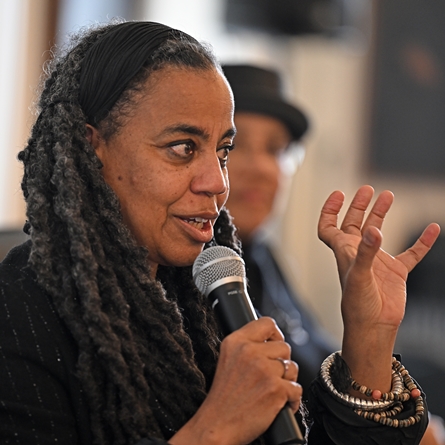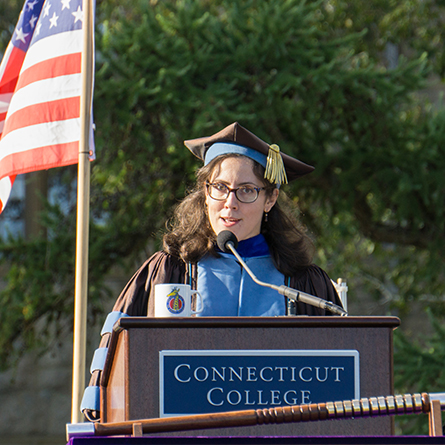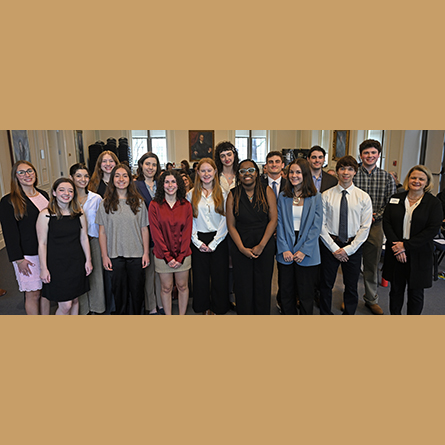
Academic year opens with 105th Convocation
For full Convocation coverage, visit conncoll.edu/events/convocation.
Members of the Class of 2023 should stick their necks out and take action on the issues that are most important to them.
That was the central theme of the keynote address delivered Monday by Associate Professor of Theater Virginia Anderson during Connecticut College’s 105th Convocation ceremony.
Anderson’s impassioned speech recounted her grandfather’s environmental activism and how he was once recognized by the Giraffe Heroes Project—an organization that celebrates people who “stick their necks out for the common good.”
Challenging the newest members of the College community to find their own ways to make a difference in the lives of others, Anderson called for compassion and civic engagement, at one point even demonstrating how easy it is to call one’s elected official and lobby on behalf of an important issue. Dialing her cell phone on stage, Anderson left a voicemail message for U.S. Senator Richard Blumenthal, asking him to stand up for LGBTQIA rights.
“There are so many ways to take meaningful action, and it doesn’t need to be a grandiose project,” Anderson said. “I encourage you to get to know and work closely with community organizations; to think critically about representations of race, gender and class in the art that you create; to learn a foreign language not only to communicate your own needs but to understand the nuanced needs of others. Your voice matters in the classroom and it matters at this college. It matters in this country, no matter where in the world you are from,” she added.
Anderson’s remarks were delivered to an exceptional and diverse group of new students, admitted from the largest number of applicants in the history of the College.
A total 514 members of the Class of 2023, along with 13 transfer students and two students returning to college come from 29 states and 40 countries from around the world, including Bangladesh, Bhutan, Bosnia and Herzegovina, Egypt, Ethiopia, Kenya, Peru, Russia, Tajikistan, Tanzania, Ukraine and Zimbabwe. An impressive 77 percent graduated in the top 20 percent of their high school classes, and the newest class is the most diverse the College has ever had—22 percent are domestic students of color and 13 percent are international students.
In introducing Anderson, President Katherine Bergeron cited the theater professor’s long history of fighting for social justice as an advocate for those with HIV and AIDS, and as a committed and passionate foster and adoptive parent.
Bergeron also discussed her experience at the PossePlus Summit in Texas this past June, where she was inspired by a question Alyss Humphrey ’22 posed on the theme of the summit, which was “the state of our union.” Humphrey reframed the theme into a question: “How do we learn to see each other’s humanity so that we are prepared to create a better union?”
“I thought about this question this summer during yet another dehumanizing news cycle of taunts and tweets targeting congresswomen of color,” Bergeron said. “I thought about it, too, in the shocking aftermath of mass shootings in Dayton and El Paso, hate crimes happening with such benumbing frequency that the humanity of victims can often be hard to see.”
As a way to confront these challenges, Bergeron described a new College initiative called the Dialogue Project, which will consist of workshops, special events and interactive classes supported by faculty and staff.
“The project will help students become self-aware, to become comfortable with the uncomfortable, to seek out contradiction, to embrace difference, to listen carefully and openly in the pursuit of common ground–all critical life skills that inform the best kind of leaders,” Bergeron explained, adding that there are four core ideas students should focus on as they embark on their education at the College: “look closely; listen deeply; think imaginatively; live honorably.”
Anderson concluded her remarks by asking the audience to assess their own actions through the sharp lens of history and make sure they do all they can to live up to the College’s commitment to good global citizenry.
“So my friends, old and new, I implore you, as difficult as it can be, as busy as I know you’ll be, pay attention to what’s happening within and beyond the boundaries of this campus, so that when people ask you what it was like to live through this remarkable period of turbulence in our nation and in our world, you’ll have a ready answer,” she said. “And consider, too, what you will say when you are asked ‘What did you do?’ I wish for you an answer you’ll be proud to give.”
See more photos from Convocation and read local news coverage of the day’s events.










